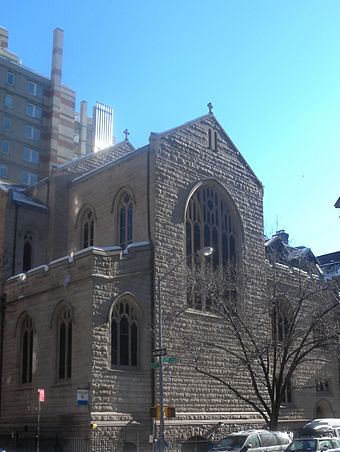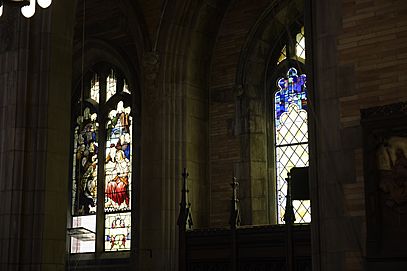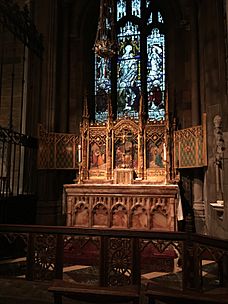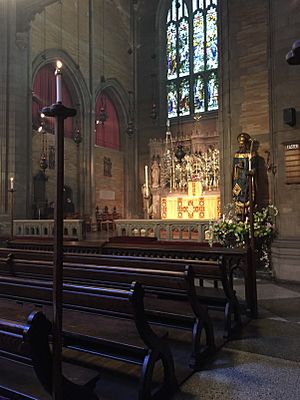St. Ignatius of Antioch Church (New York City) facts for kids
Quick facts for kids |
|
|
St. Ignatius of Antioch Episcopal Church
|
|
 |
|
| Location | 552 W. End Ave., New York, New York |
|---|---|
| Area | less than one acre |
| Built | 1903 |
| Architect | Haight, Charles C.; Cram & Ferguson |
| Architectural style | Late Gothic Revival |
| NRHP reference No. | 99001442 |
| Added to NRHP | November 30, 1999 |
St. Ignatius of Antioch Episcopal Church is a historic church in Manhattan's Upper West Side neighborhood in New York City. This beautiful church is located at 552 West End Avenue. Built in 1903, it is so important that it was added to the National Register of Historic Places in 1999. This means it is recognized as a special part of American history.
Contents
A Church with a Unique History
The church's community, or congregation, started in 1871. It was founded by Reverend Dr. Ferdinand C. Ewer as part of the Anglo-Catholic movement. This part of the Episcopal Church has traditions and styles of worship that are similar to the Catholic Church.
Why Is It Named for St. Ignatius?
The church is named after Ignatius of Antioch, a bishop who lived in the first century. He was chosen because he taught that the Eucharist (a Christian ceremony) and the bishop's leadership were very important for uniting the church.
At first, the church's new ideas and practices caused some disagreements with church leaders in New York. But the community was dedicated to its beliefs. Before moving to its current home, the congregation met in two other locations in the city.
A New Building for a Growing Community
The current church building was finished in 1902. It was designed to support the church's special worship style. For example, it has a permanent basin for holy water and a built-in confessional booth.
When the new church opened, the Bishop of New York did not attend because he disagreed with some of the church's practices. Instead, Bishop Charles C. Grafton of Fond du Lac, a major leader in the Anglo-Catholic movement, led the opening service.
Over time, St. Ignatius of Antioch became known for being a welcoming place. It was among the first Anglo-Catholic churches to support women as priests.
Amazing Architecture and Design
The church was designed by the famous architect Charles C. Haight, who also designed other important buildings in New York. The style is called English Gothic, which is known for its graceful and grand look.
What Is the Church's Interior Like?
Inside, the church is shaped like a cross, which is called a cruciform plan. The walls are made of Roman brick, and large stone arches support a high wooden roof. Some of the ceilings in smaller rooms have a special design called Guastavino tile, which creates beautiful, strong arches.
Between 1924 and 1930, more decorations were added to the church's interior. These additions were guided by another well-known architect, Ralph Adams Cram. They include a fancy cover for the baptismal font, carved wooden art showing the Stations of the Cross, and colorful statues of the Virgin Mary and St. Ignatius.
Music at St. Ignatius
Music is a very important part of life at St. Ignatius. The church has a professional choir that is famous for its excellent singing, especially of music from the Renaissance period (from the 1400s to the 1600s).
The church's large pipe organ was built in 1966 by Casavant Frères, a company from Québec, Canada. After the organ was damaged by a water leak, it was carefully repaired and improved in 2010 and 2011.
Because the church building has amazing acoustics (meaning sound travels very well inside), it is a popular place for concerts. Many people come to hear beautiful music performed in this historic space.
More Images of the Church
See also
 In Spanish: Iglesia Episcopal de San Ignacio de Antioquía (Nueva York) para niños
In Spanish: Iglesia Episcopal de San Ignacio de Antioquía (Nueva York) para niños
 | Claudette Colvin |
 | Myrlie Evers-Williams |
 | Alberta Odell Jones |










